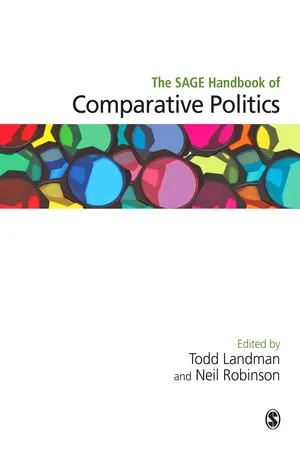
The SAGE Handbook of Comparative Politics
- 560 pages
- English
- PDF
- Available on iOS & Android
The SAGE Handbook of Comparative Politics
About this book
?The SAGE Handbook of Comparative Politics is a major new resource for scholars of comparative politics, and of political science more generally. The Handbook covers the field with admirable thoroughness, but does not sacrifice depth for breadth. The chapters are written by notable scholars who provide rich discussions of their topics, and help to move the sub-discipline forward? - B. Guy Peters, Professor, University of Pittsburgh
The SAGE Handbook of Comparative Politics presents; in one volume, an authoritative overview of the theoretical, methodological and substantive elements of comparative political science. The 28 specially commissioned chapters, written by renowned comparative scholars, guide the reader through the central issues and debates, presenting a state-of-the-art guide to the past, present and possible futures of the field.
The Handbook is divided into three parts. The first considers comparative methodologies and reviews the interactions between various sub-fields of comparative politics: political economy; political sociology; area studies; international relations; and institutional analysis. The second section examines nine ?classic? issues of concern to comparativists, including government formation, political behaviour and democratization. In the final section, nine new and emerging areas of comparative research are considered, such as terrorism, electoral corruption, human rights and regional integration.
The SAGE Handbook of Comparative Politics is an essential resource for researchers in political science, political sociology, political economy, international relations, area studies and all other fields with a comparative political dimension.
Frequently asked questions
- Essential is ideal for learners and professionals who enjoy exploring a wide range of subjects. Access the Essential Library with 800,000+ trusted titles and best-sellers across business, personal growth, and the humanities. Includes unlimited reading time and Standard Read Aloud voice.
- Complete: Perfect for advanced learners and researchers needing full, unrestricted access. Unlock 1.4M+ books across hundreds of subjects, including academic and specialized titles. The Complete Plan also includes advanced features like Premium Read Aloud and Research Assistant.
Please note we cannot support devices running on iOS 13 and Android 7 or earlier. Learn more about using the app.
Information
Table of contents
- Cover
- Contents
- List of Tables and Figures
- Acknowledgements
- Notes on Contributors
- Introduction
- PART I - Methods and Fields of Comparative Politics
- 1 The Distinctiveness of Comparative Research
- 2 Global Comparative Methods
- 3 Case Studies
- 4 Is there a Quantitative-Qualitative Divide in Comparative Politics? The Case of Process Tracing
- 5 Establishing Equivalence
- 6 Comparative Political Sociology
- 7 Comparative Institutional Analysis
- 8 Comparative Political Economy
- 9 The Contribution of Area Studies
- 10 Comparative Politics and International Relations
- PART II - Classic Issues in Comparative Politics
- 11 Post-Industrial Democracies: Political Economy and Democratic Partisan Competition
- 12 Government Formation
- 13 Institutional Design
- 14 Comparative Political Behaviour: What is being Compared?
- 15 Changes in the Causes of Democratization through Time
- 16 Political Culture
- 17 Revolution
- 18 Social Movements
- 19 Corruption
- PART III - New and Emerging Issues in Comparative Politics
- 20 Electoral Authoritarianism
- 21 Electoral Corruption
- 22 Comparative Federalism
- 23 Human Rights
- 24 Governance
- 25 Terrorism
- 26 Comparative Regional Integration and Regionalism
- 27 Transitional Justice
- 28 The Globalization of Comparative Public Opinion Research
- Index